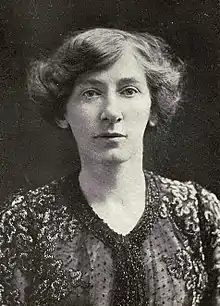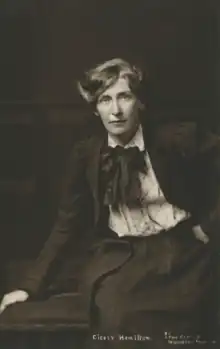Cicely Hamilton | |
|---|---|
 Cicely Hamilton, c. 1907 | |
| Born | Cicely Mary Hammill 15 June 1872 Paddington, London, England |
| Died | 6 December 1952 (aged 80) |
| Occupation(s) | Actor, playwright, novelist |
| Known for | Suffragette, event organiser |
Cicely Mary Hamilton (née Hammill; 15 June 1872 – 6 December 1952), was an English actress, writer, journalist, suffragist and feminist, part of the struggle for women's suffrage in the United Kingdom. She is now best known for the feminist play How the Vote was Won, which sees a male anti-suffragist change his mind when the women in his life go on strike.[1][2] She was also the author of one of the most frequently performed suffrage plays, A Pageant of Great Women (1909), which featured the character of Jane Austen as one of its "Learned Women.[3]"[4]
Biography
Born in 1872, Cicely Hammill in Paddington, London, she was the eldest of the four children of Maude Mary and Denzil Hammil. She was educated in Malvern, Worcestershire and in Bad Homburg vor der Höhe.[5] Hammill was raised by foster parents because her mother had gone missing.[2] After a short spell in teaching, she acted in a touring company. She took the pseudonym "Cicely Hamilton" out of consideration for her family. Then, she wrote drama, including feminist themes, and enjoyed a period of success in the commercial theatre. Hamilton was praised for her acting in a performance of Fanny's First Play by George Bernard Shaw.[2]
In 1908, she and Bessie Hatton founded the Women Writers' Suffrage League. This grew to around 400 members, including Ivy Compton-Burnett, Sarah Grand, Violet Hunt, Marie Belloc Lowndes, Alice Meynell, Olive Schreiner, Evelyn Sharp, May Sinclair, and Margaret L. Woods. It produced campaigning literature, written by Sinclair amongst others, and recruited many prominent male supporters.

Hamilton supplied the lyrics of "The March of the Women", the song which Ethel Smyth composed in 1910 for the Women's Social and Political Union,[6] was first performed at an 'At Home' in Suffolk Street Galleries, Pall Mall to celebrate the release of women violently arrested on Black Friday; it had suitably stirring lyrics for such an occasion:
Shout, shout up with your song!
Cry with the wind for the dawn is breaking.
March, march swing you along,
Wide blows our banner and hope is waking,
Sing with its story, dreams with their glory,
Lo! They call and glad is their word!
Forward! Hark how it swells
Thunder and freedom, the voice of the Lord![7]
In the days before radio, one effective way to get a message out into society and to have it discussed was to produce short plays that could be performed around the country, and so suffrage drama was born. Elizabeth Robins's "Votes for Women" and Cicely Hamilton and Christopher St. John's "How the Vote Was Won" are two predominant examples of the genre.[8] Hamilton also wrote "A Pageant of Great Women", a highly successful women's suffrage play based on the ideas of her friend, the theatre director Edith Craig. Hamilton played 'Woman' while Craig played the painter Rosa Bonheur, one of the 50 or so great women in the play.[9] Lena Connell's photographs of the leading players were sold to assist the suffrage cause and Connell exhibited the pictures at the Royal Photographic Society in 1910-11.[10] The play was produced all over the UK from 1909 until the First World War.[9] Hamilton was a member of Craig's theatre society, the Pioneer Players. Her play "Jack and Jill and a Friend "was one of the three plays in the Pioneer Players' first production in May 1911.[11] Hamilton inspired young schoolgirls, supportive of suffrage, like Winifred Starbuck, who had Hamilton and other leaders' pictures on her desk in purple, white and green frames and later herself protested by school disorder, such as graffiti and hiding the school registers and handbell, as a milder form of resistance to authority for women's suffrage.[7]
During World War I, Hamilton initially worked in the organisation of nursing care, with the Scottish Women's ambulance service near Paris,[7] and then joined the army as an auxiliary.[2] Later she formed a repertory company to entertain the troops. After the war, she wrote as a freelance journalist, particularly on birth control, and was a press officer for the Geneva International Suffrage Conference[7] and as a playwright for the Birmingham Repertory Company.[2] When Lena Ashwell Players Ltd was formed in 1923, Hamilton was one of the directors. The other three were Lena Ashwell, Esme Church and Marion Fawcett, who were the company's theatre managers.[12]
Hamilton was a regular contributor to Time and Tide magazine, and an active member of the feminist Six Point Group, campaigning for the rights of children, widows and unmarried mothers; equal guardianship of children, and equal pay in teaching and civil service.[7][2][13] In 1938, she was given a Civil List pension. She was a friend of E. M. Delafield and is thought to be the model for "Emma Hay" in Delafield's "Provincial Lady" books.[14]
Hamilton's "Theodore Savage" (1922, vt. Lest Ye Die 1928) is a science-fiction novel about a Britain devastated by a war.[15]
Hamilton's autobiography "Life Errant" was published in 1935. She died in Chelsea in 1952.[7]
In July 2017, the Finborough Theatre staged the first London production of Hamilton's play "Just to Get Married" in over 100 years. It received positive reviews (4 stars) from The Times,[16] The Observer,[17] The Evening Standard[18] and The New York Times.[19]
Works

- The Traveller Returns (1906) play
- Diana of Dobson's (novel, play 1908)
- Women's Votes (1908)
- Marriage as a Trade (1909)
- How the Vote was Won (1909) play
- A Pageant of Great Women (1910) play
- Just to Get Married (1911) play
- Jack and Jill and a Friend (1911) play
- Lady Noggs (1912) play
- William - an Englishman (1919) novel (Reprinted by Persephone Books in 1999)
- The Child in Flanders: A Nativity Play (1922)
- Theodore Savage: A Story of the Past or the Future (1922)
- The Old Adam (1924) play
- Non-Combatant (1924)
- The Human Factor (1925)
- The Old Vic (1926) with Lilian Baylis
- Lest Ye Die (1928)
- Modern Germanies, as seen by an Englishwoman (1931)
- Modern Italy, as seen by an Englishwoman (1932)
- Modern France, as seen by an Englishwoman (1933)
- Little Arthur's History of the Twentieth Century (1933)
- Modern Russia, as seen by an Englishwoman (1934)
- Modern Austria, as seen by an Englishwoman (1935)
- Life Errant (1935) autobiography
- Modern Ireland, as seen by an Englishwoman (1936)
- Modern Scotland, as seen by an Englishwoman (1937)
- Modern England, as seen by an Englishwoman (1938)
- Modern Sweden, as seen by an Englishwoman (1939)
- The Englishwoman (1940)
- Lament for Democracy (1940)
- The Beggar Prince (1944) play
- Holland To-day (1950)
Notes
- ↑ "Cicely Hamilton, Independent Feminist", Frontiers: A Journal of Women Studies, Vol 11 No. 2/3 1990
- 1 2 3 4 5 6 Lisa Shariari, "Hamilton, Cicely" in Faye Hammill, Ashlie Sponenberg and Esme Miskimmin (ed.), Encyclopedia of British Women's Writing, 1900-1950. Basingstoke : Palgrave Macmillan, 2006. ISBN 9781403916921 (pp. 105-6)
- ↑ "A Pageant of Great Women: The Suffragettes and Performance". Glasgow Women's Library. 21 October 2014. Retrieved 26 August 2021.
- ↑ Looser, Devoney (2017). The Making of Jane Austen. Baltimore, MD: Johns Hopkins University Press. p. 169. ISBN 978-1421422824.
- ↑ Joannou, Maroula. "Hamilton [née Hammill], (Mary) Cicely (1872–1952), writer and campaigner for women's rights". Oxford Dictionary of National Biography (online ed.). Oxford University Press. doi:10.1093/ref:odnb/38633. Retrieved 12 February 2020. (Subscription or UK public library membership required.)
- ↑ Bennett, Jory (1987). Crichton, Ronald (ed.). The Memoirs of Ethel Smyth: Abridged and Introduced by Ronald Crichton, with a list of works by Jory Bennett. Harmondsworth: Viking. p. 378. ISBN 0-670-80655-2.
- 1 2 3 4 5 6 Atkinson, Diane (2018). Rise up, women! : the remarkable lives of the suffragettes. London: Bloomsbury. pp. 245, 540. ISBN 978-1-4088-4404-5. OCLC 1016848621.
- ↑ Maroula Joannou & June Purvis, The Women's Suffrage Movement: New Feminist Perspectives (Manchester University Press, 1998), 127
- 1 2 Cockin, Katharine. Edith Craig (1869–1947): Dramatic Lives, Cassell (1998).
- ↑ Cockin, Katharine (26 January 2017). Edith Craig and the Theatres of Art. Bloomsbury Publishing. ISBN 978-1-4725-7063-5.
- ↑ Cockin, Katharine. Women and Theatre in the Age of Suffrage: The Pioneer Players 1911–25, Palgrave (2001)
- ↑ Leask, Margaret (2012). Lena Ashwell: Actress, Patriot, Pioneer. Univ of Hertfordshire Press. p. 1914. ISBN 978-1-907396-64-9.
- ↑ Anne Logan, Feminism and criminal justice : a historical perspective. New York : Palgrave Macmillan, 2008. ISBN 9780230584136 (pp. 24-5)
- ↑ "EM Delafield Who's Who". www.starcourse.org.
- ↑ E. F. Bleiler and Richard Bleiler. Science-Fiction: The Early Years. Kent State University Press, 1990. (p.331). ISBN 9780873384162.
- ↑ Treneman, Ann (1 August 2017). "Theatre review: Just to Get Married at the Finborough Theatre, SW10". The Times. ISSN 0140-0460. Retrieved 23 January 2018.
- ↑ Clapp, Susannah (6 August 2017). "Just to Get Married; Road review – fire and anxiety". The Guardian. Retrieved 23 January 2018.
- ↑ "Just to Get Married, theatre review: Catch this now or risk waiting a century | London Evening Standard". 23 August 2017. Archived from the original on 23 August 2017. Retrieved 4 June 2021.
- ↑ Brantley, Ben (7 August 2017). "Women Without Options and Spoiled for Choice". The New York Times. Retrieved 23 January 2018.
References
- Bleiler, Everett (1948). The Checklist of Fantastic Literature. Chicago: Shasta Publishers. p. 112.
- Lis Whitelaw (1990) The Life & Rebellious Times of Cicely Hamilton
Further reading
- Stowell, S. (1994). A stage of their own: Feminist playwrights of the suffrage era. Ann Arbor, Mich: Univ. of Michigan Press. p. 71–99.
External links
- Works by Cicely Hamilton in eBook form at Standard Ebooks
- Works by Cicely Hamilton at Project Gutenberg
- Library resources in your library and in other libraries about Cicely Hamilton
- Online books, and library resources in your library and in other libraries by Cicely Hamilton
- page at Literary Encyclopedia
- page at Spartacus
- AHRC Ellen Terry and Edith Craig Archive Database
- Author Profile at Persephone Books Archived 19 March 2018 at the Wayback Machine
- William – An Englishman at Persephone Books
- Works by or about Cicely Hamilton at Internet Archive
- Works by Cicely Hamilton at LibriVox (public domain audiobooks)

- Play script of 'A Child in Flanders' accessible from The Great War Theatre Project